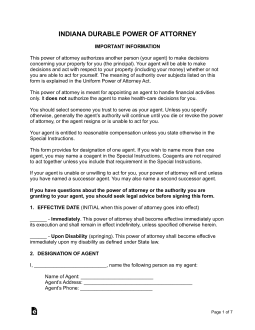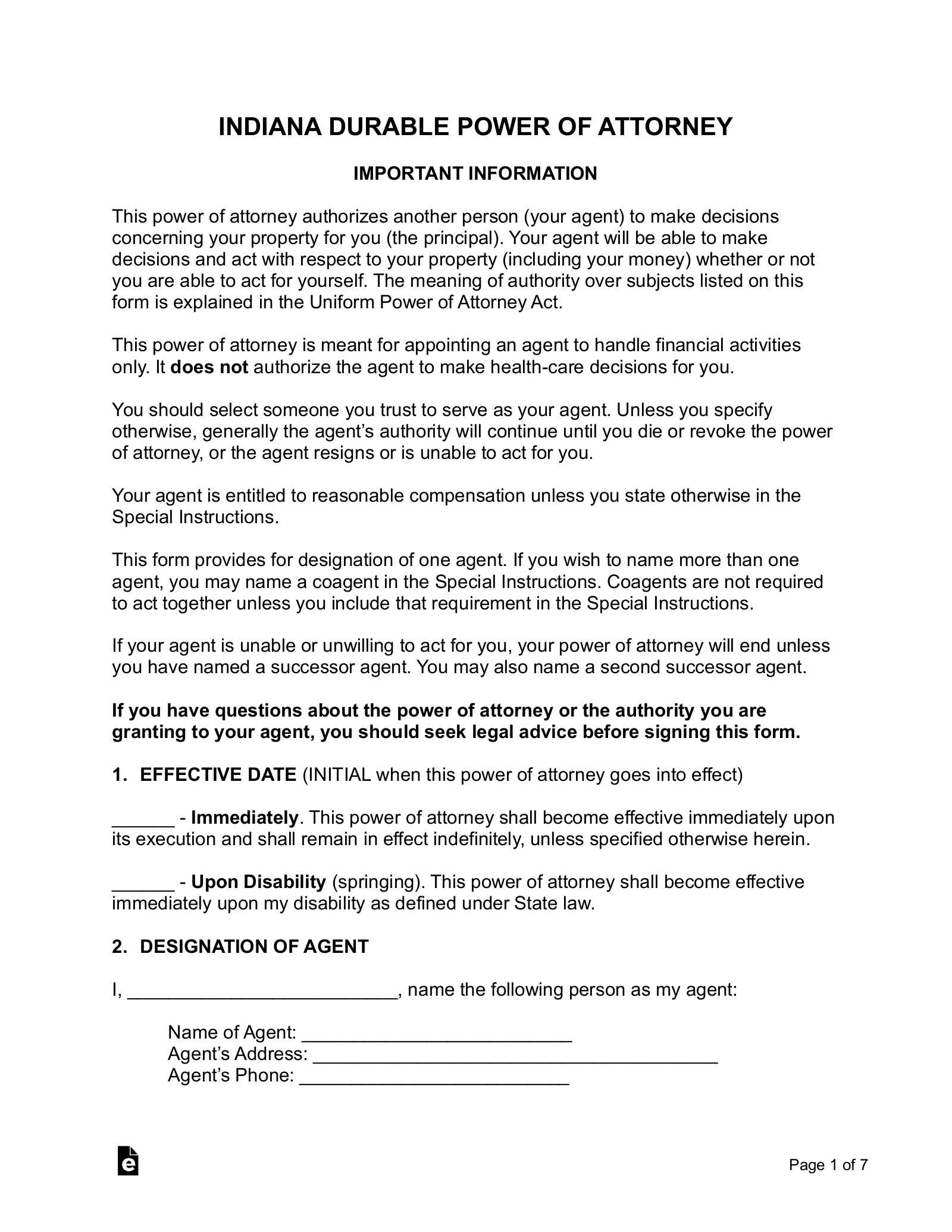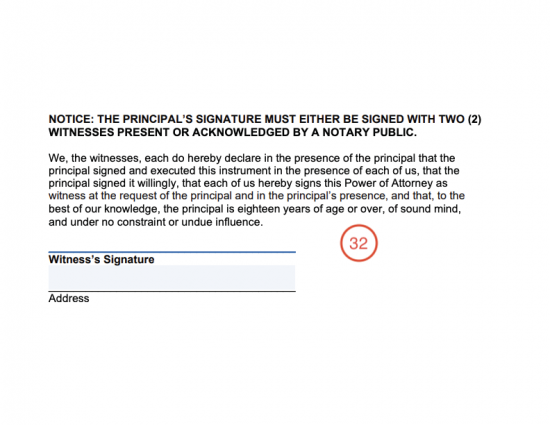Updated March 18, 2024
An Indiana durable power of attorney form can be used to appoint a representative or “agent” to exercise control over a person’s finances. If selected, the agent will have ultimate control to decide whatever they want to do regarding making business decisions on behalf of the principal. The “durable” designation means the form remains legal if the represented principal becomes incapacitated. Therefore, the person selected as the agent must be someone who can be trusted.
Table of Contents |
Laws
Title 30, Article 5 (Powers of Attorney)
Definition of “Durable”
The Indiana Code does not define “durable.
Definition of “Power of Attorney”
“Power of attorney” means a writing or other record that grants authority to an attorney in fact or agent to act in place of a principal, whether the term “power of attorney” is used. The term refers to all types of powers of attorney, including durable powers of attorney, except for the following:
(1) A power to the extent it is coupled with an interest in the subject of the power, including a power given to or for the benefit of credit in connection with a credit transaction.
(2) A proxy or other delegation to exercise voting rights or management rights with respect to an entity.
(3) A power created on a form prescribed by a government or governmental subdivision, agency, or instrumentality for a governmental purpose (IC 30-5-2-7)
Signing Requirements
The principal is required to sign in the presence of a notary public or with 2 witnesses ((IC 30-5-4-1(a)(4))
Statutory Form
The Indiana Legislature has not provided a sample statutory power of attorney form.
How to Write
Download: PDF, MS Word, OpenDocument
Indiana Declaration
(1) Date.
(2) Principal Name. The Indiana Resident is the Private Party seeking to grant the authority needed to act in one or more affairs on his or her behalf in the State of Indiana to a specific Agent should be named as the Issuer of this paperwork.
(3) Principal Location.
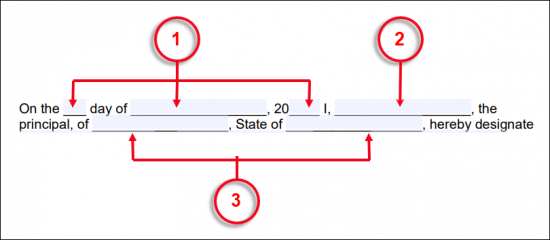
(4) Attorney-in-Fact. The full name of the Party who must be set to assume the role of the Principal’s Agent (also known as the Attorney-in-Fact) through this document’s execution must be identified.
(5) Attorney-in-Fact Location.
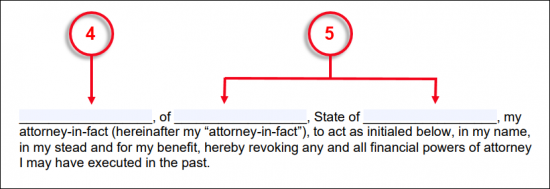
Effective Date
(6) Starting Date Or Event. Before proceeding to define what actions the Principal authorizes the Attorney-in-Fact to perform in his or her name, the Kentucky Principal will need to define when such ability will be available to the Attorney-in-Fact. This can be done quickly by defining the effective date of this document as the Principal’s signature date or as the date, a Physician formally declares the Principal incapacitated and unable to handle financial affairs. Only one of the statements in the “Effective Date” section can (and must) be initialed by the Principal to declare when the authority being granted to the Attorney-in-Fact is accessible.
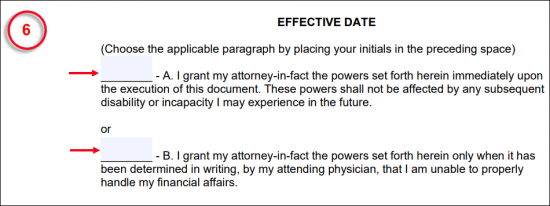
Power Of Attorney-in-Fact
(7) Incorporation Of Powers. The Indiana Principal will need to initial the first item on a list of powers to give the general authority needed to coordinate the principal powers to be granted for the Attorney-in-Fact’s use.

(8) Real Property Transactions. If the Attorney-in-Fact will be expected to handle real estate transactions such as making loans, establishing leases, issuing, or pursuing quitclaim deeds, handling mortgages, deal with encumbrances, and any other relevant action then the second item must be initialed by the Principal.
(9) Tangible Personal Property Transactions. The Principal can designate the Agent with the ability to accept or reject gifts of tangible personal property, sell/exchange, handle interests with tangible property, and other such actions by approving the use of § 30-5-5-3 of the Indiana Code by the Attorney-in-Fact on the Principal’s behalf.
(10) Bond, Share, And Commodity Transactions. The Attorney-in-Fact can maintain, insure, protect, contest taxes, and other such actions to carry out the Principal’s directives with his or her bonds, shares, and commodities so long as the Principal initials the fourth statement.
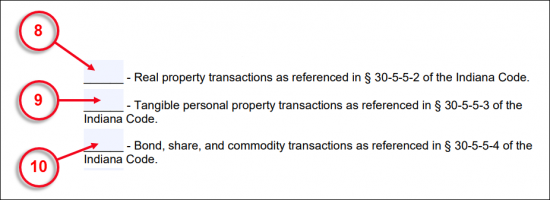
(11) Retirement Plans. The Principal can give the Attorney-in-Fact the power to handle matters regarding retirement plans, annuities, and retirement accounts as defined by Section 408(A) of the Internal Revenue Code. This type of authority deals with a wide scope of actions having to do with the Principal’s retirement plans (i.e. deferring payments).

(12) Banking Transactions. The Principal can use this document to issue the Attorney-in-Fact the authority to open, close, modify, and maintain the Principal’s bank accounts as well as engage any other arrangements allowable between banks and the Principal.
(13) Business Operating Transactions. The Principal’s business arrangements can be delegated to the Attorney-in-Fact’s scope of powers with the Principal’s approving initials on the sixth items. This shall enable the Attorney-in-Fact to handle the Principal’s status within a Business Entity (i.e. enforcing Partnerships, stepping down from a Board of Directors), pursue sales, make sales, determining insurance (for the Principal’s Business Entity) as well as engage other decisions and actions with the same functionary authority the Principal possesses.

(14) Insurance Transactions. The Principal will need to initial the appropriate item if he or she intends to have the Attorney-in-Fact make decisions and perform actions with his or her insurance policies and companies.
(15) Transfer On Death Transfers. The Attorney-in-Fact can perform actions such modify the Beneficiary designations made by the Principal, effect payable transfers upon the Principal’s death, and other such actions so long as the Principal initials his or her approval.
(16) Beneficiary Transactions. If the Attorney-in-Fact should have the power to deal with the administration or the dispositions of custodianships, guardianships, probate estates, or an escrow along with relevant actions such as participating in arbitrations, settlements, or transfers.
(17) Gift Transactions. The power to engage in gifting on behalf o the Principal (i.e. to charitable organizations or other Parties) can be conveyed to the Attorney-in-Fact through the approval of the eleventh item. This includes participating in negotiations, arbitration, and claims on behalf of the Principal.
(18) Fiduciary Transactions. If the Principal wishes to approve the Attorney-in-Fact to exhibit the same administrative powers and judicial fiduciary powers that he or she carries as a Trustee, Escrow Agent, or similar entity then direct authorization must be provided through his or her initials.
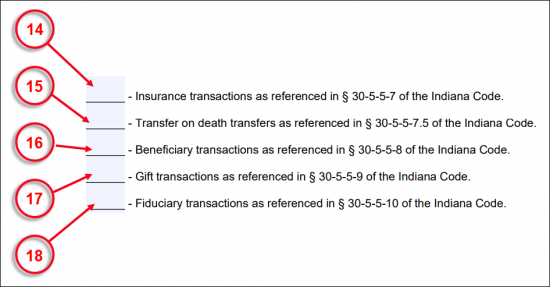
(19) Claims And Litigation. The Principal can authorize the Attorney-in-Fact’s action regarding claims, causes of action, appeals, and other legal maneuvers by initialing the appropriate statement.
(20) Family Maintenance. The ability to handle domestic or family expenses and other responsibilities (i.e. living quarters) on behalf of the Principal can also be authorized through the initials of the Principal.
(21) Benefits From Military. The Principal must provide initials of authorization to grant the Attorney-in-Fact the power to carry out his or her directives (i.e. filing, contesting, applying, receiving) with military benefits.
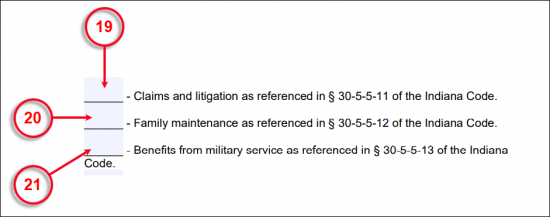
(22) Records, Reports, Statements. The Attorney-in-Fact can be granted the authority to create, access, remove, and otherwise manage the Principal’s financial records provided the Principal delivers his or her initials of approvals.
(23) Electronic Records.
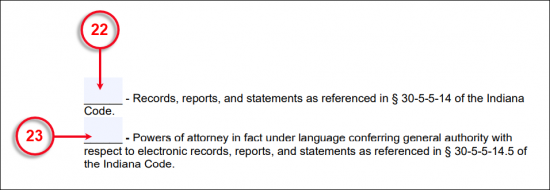
(24) Estate Transactions. Principal directives involving matters of estate such as the bequeathment of property, retirement plans, and/or life insurance can be granted to the Attorney-in-Fact’s principal authority using this paperwork. This requires the direct authorization of the Principal’s initials presented appropriately.

(25) Health Care Powers. The Principal can grant the Agent powers to handle his or her admittance and discharges from medical institutions, request an autopsy, access/review the Principal’s medical records, make anatomical gifts (organ donations), and employ medical providers and counselors through this document once the appropriate list item is initialed by the Principal. This will not necessarily give the Attorney-in-Fact the ability to consent or deny medical treatment. Such actions require additional documentation (i.e. a medical power of attorney).
(26) Treatment Consent And Refusal. To give the Attorney-in-Fact the right to deliver the Principal’s consent or refusal of treatments requires direct Principal approval displayed with his or her initials.

(27) Delegation Of Authority. The Attorney-in-Fact may appoint additional Agents to wield principal authority with the goal of carrying out the Principal’s directives only if the Attorney-in-Fact has been given the authority to do so through this document.
(28) All Matters. The Principal should not initial every power subject above to grant authority in each one to the Attorney-in-Fact. Instead, the Principal should initial the final item of this list. This action will automatically grant every power discussed above to the Attorney-in-Fact.

Special Instructions
(29) Appointment Provisions. A distinct area has been set aside to receive the Principal’s directions in the form of limitations or restrictions on the powers above, conditions that must be in effect for the Agent to act, or extensions to the basic actions above by specific approvals and instructions. An attachment can be used to list this information if not enough room is provided.

Effective Signature
(30) Signature Date.
(31) Principal Intent. The Principal must prove his or her decision to appoint the authority above to the Attorney-in-Fact’s control by signing his or her name on the signature date above.

Notary Public OR Two (2) Witnesses
(32) Notarization or Witnesses. A basic requirement for the Principal’s act of signing is that it must occur in the presence of either a Notary Public recognized by the State of Indiana or before Two (2) Witnesses. The Principal may seek acknowledgment in only one of those two capacities. Once they do so, the appropriate section must be filled out.
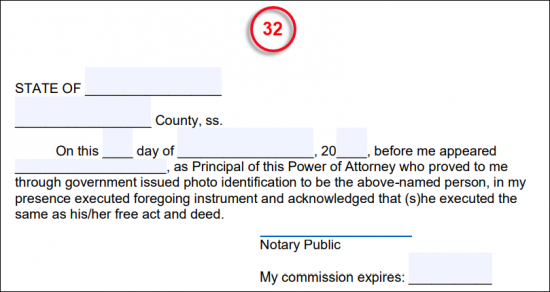
Specimen Signature And Acceptance
(33) Attorney-in-Fact. The printed name of the Attorney-in-Fact is a required entry.
(34) Attorney-in-Fact’s Signature. The Attorney-in-Fact should be allowed to review this paperwork as well as the declaration statement at its end. Upon his or her comprehension and acknowledgment, the Attorney-in-Fact should sign his or her name.
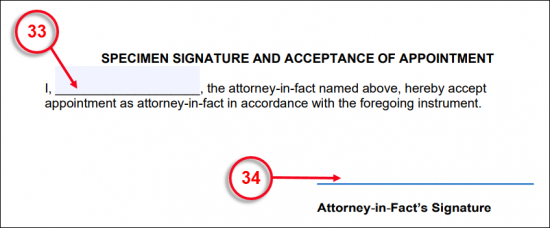
(35) Specimen Signature Notarization (If Applicable). If a Notary Public acknowledged the document instead of witnesses, the Notary shall use the final area to verify the Attorney-in-Fact’s act of signing through the process of notarization.
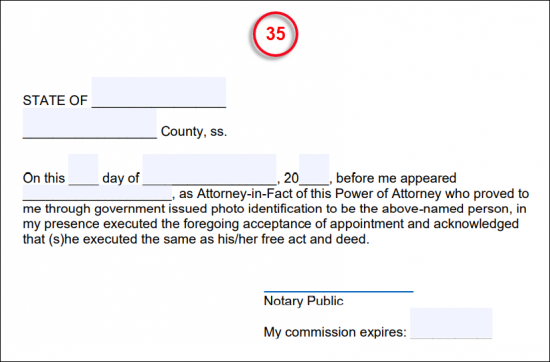
Related Forms
Download: PDF
Download: PDF, MS Word, OpenDocument

